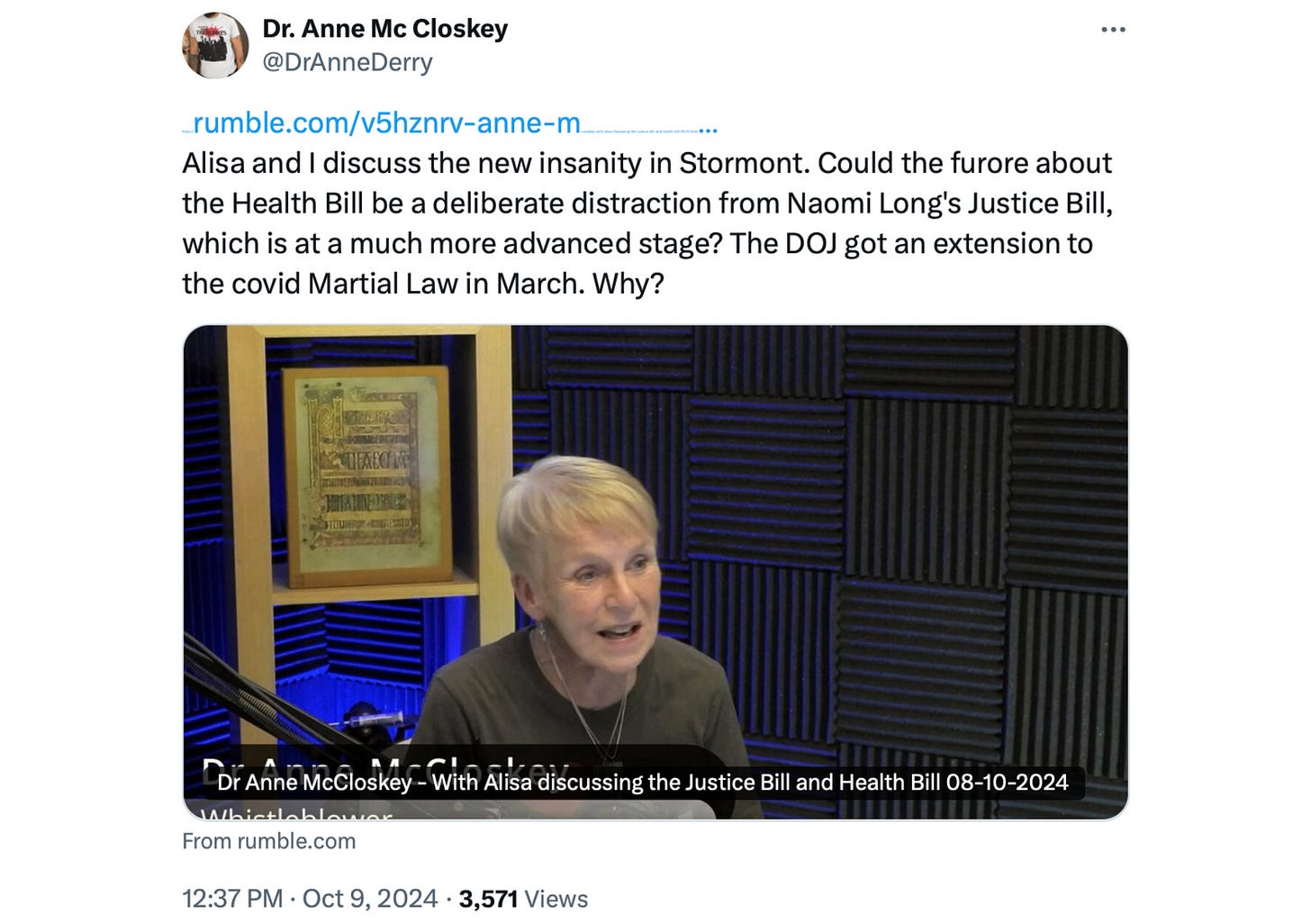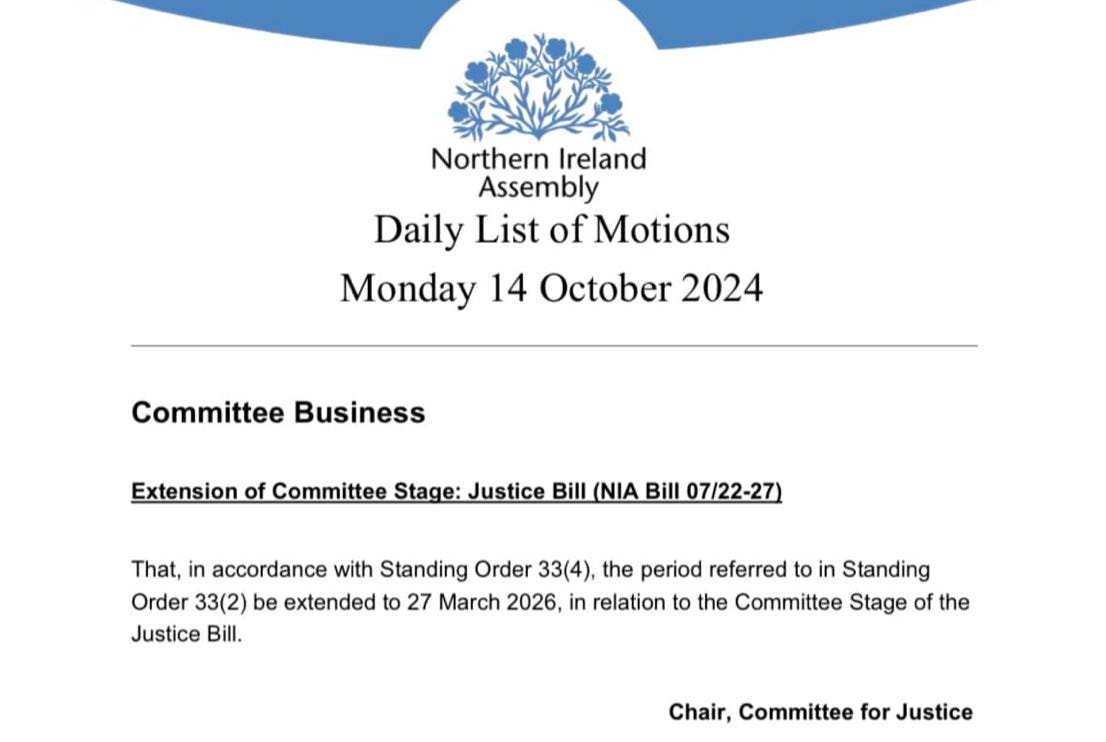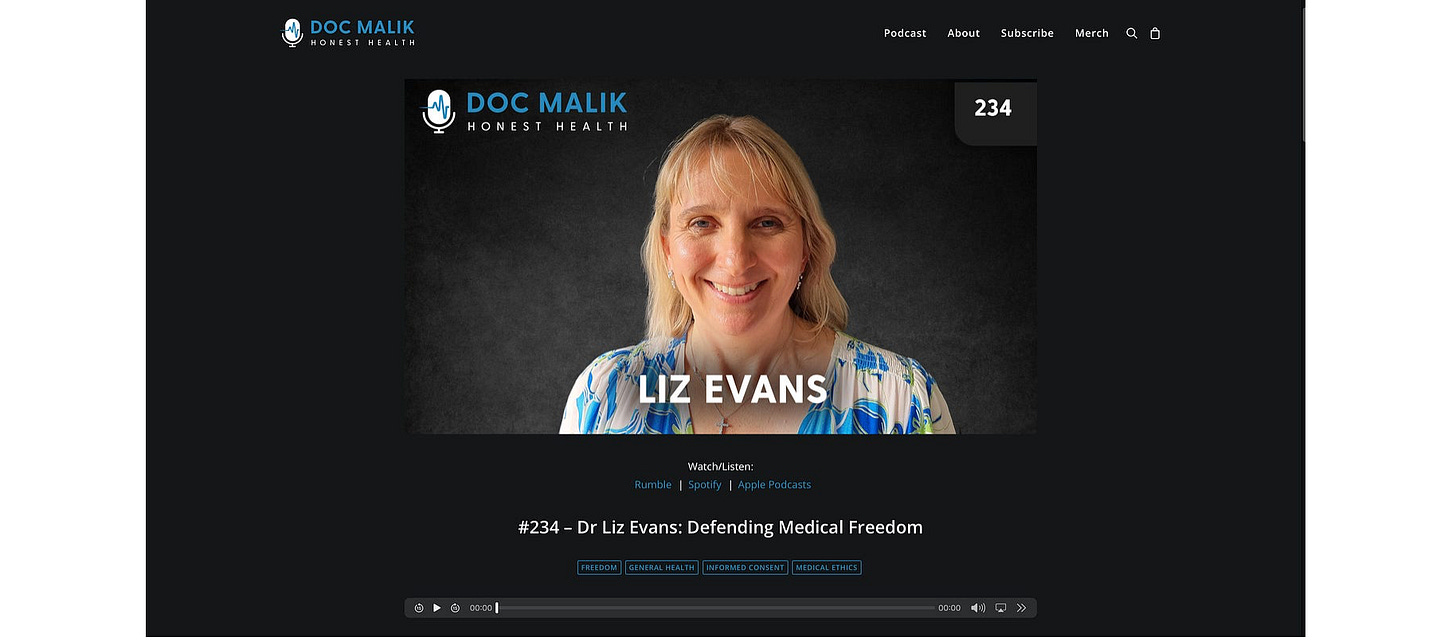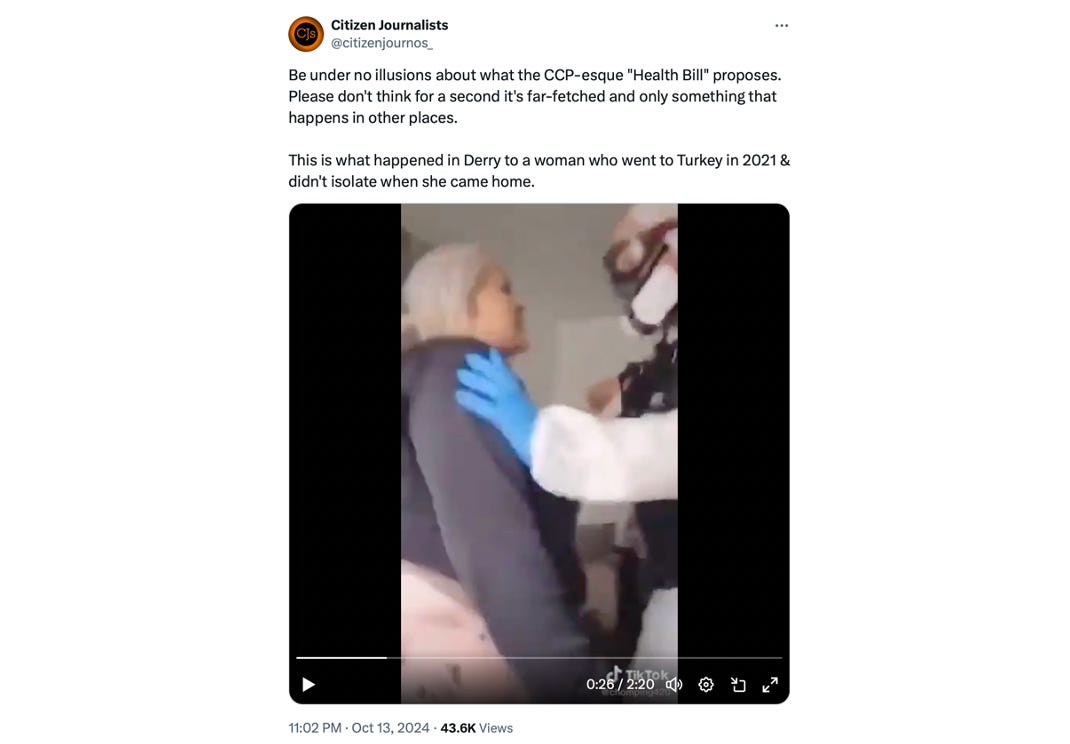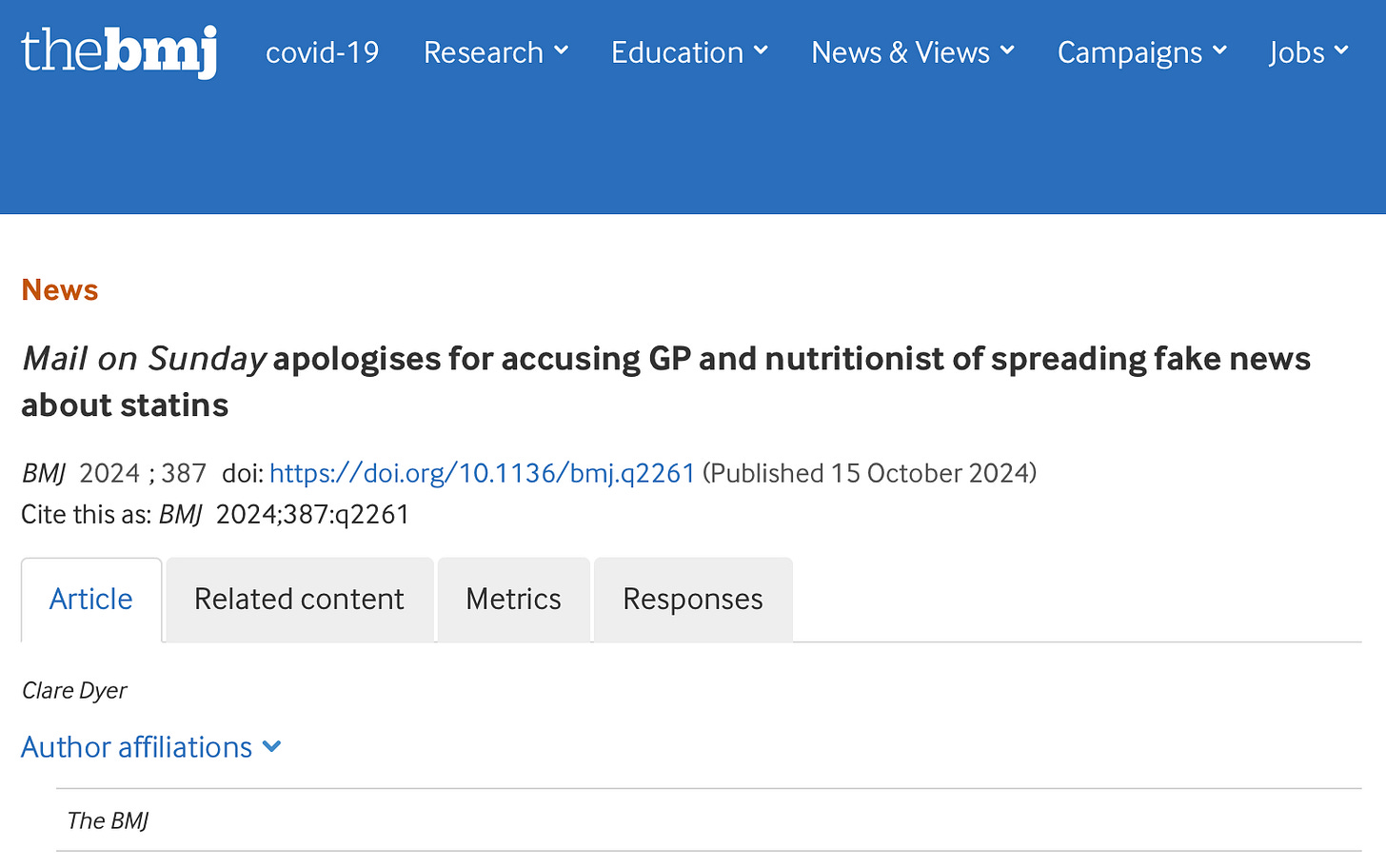Northern Ireland: an important update
Are people being distracted from the dangers of the Justice Bill, which is at an advanced stage? And what else is in the Health Bill?
Dear Church Leaders (and everyone else)
I was going to put this in the October updates post, but I think it is sufficiently important to merit an article of its own.
The dangers of the Justice Bill
While many have been focused on the draconian health laws proposed for Northern Ireland discussed here…
…Northern Irish GP Anne McCloskey has recently highlighted the dangers of the Justice Bill, which is at a much more advanced stage:
While, on the face of it, the Justice Bill might look fairly innocuous…
…I encourage everyone to listen to what Dr McCloskey has to say in this podcast, with Doc Malik, particularly from 1:42-3:30 and 35:30-41:25 (transcript below):
[1:42-3:30] I listened to the podcast you did with Melissa [Ciummei], who is a friend of mine, a woman I respect enormously. She’s capable and clever, and you made a great job of discussing the dystopian reality that this bill is going to be.
But there are two things I want to talk about today...
First of all is the framing of the response, which Melissa advocates, which I fundamentally don’t agree with. [More discussion on this from 3:30]
And the second thing is that there is a more sinister bill which is at a more advanced stage. They are trying… to bring in amendments to the Justice Act (1984). And our Minister for Justice is obviously in a mad hurry. And this is actually at a more advanced stage. It’s at the second reading stage.
One of the MLAs challenged her in the House and then put it up on Facebook — and I suppose my friend and I came across it quite accidentally — where the Minister for Justice is wanting essentially to move the entire justice [system online].
Now they’ve been at this for a couple of years, in fact probably a couple of decades, under the radar. And she is essentially wanting to give the magistrates courts, which are not courts of record, powers to… move the whole thing online, which is terrifying. It does away with habeas corpus. It does away with your right to face your accuser. It does away with your right to provide evidence. It does away with the fact that you can have witnesses in the court. It essentially does away with law.
Now I am going to tell you about my experiences in a digital court while in His Majesty’s Custody recently…
[35:30-41:25] Let me tell you about online courts. I was arrested outside the supermarket… outside my post office actually… where I’d just posted a pile of affidavits at about 8 o’clock one night. I was taken in handcuffs…
I live about a quarter of a mile from the Waterside custody suite which is the brand new all-singing, all-dancing custody suite with screens in every room for digital court appearances.
I was arrested, and instead of taking me there — to this new thing that opened… on 1st December last year — they drove me to Coleraine, which is an hour’s drive away, to a custody suite which was decommissioned in November 2023.
They kept me in a freezing cold cell. No food. No blankets. They took my hoodie from me because it had a string in it… in case I hung myself for a £100 fine. And I didn’t sleep all night.
I kept asking, “Am I going to court in Derry. Will I be in the Derry court?” [They answered] “You’ll be in the court in Londonderry.” [I asked] “Will transport be arranged?” [They answered] “Oh yes, transport will be arranged.”
I left the cell in the morning, but I didn’t know what time it was… I had to actually ask somebody to find out what time it was. I had no idea. They brought me up a corridor. A police constable assaulted me on the way up because I wanted to bring my Bible with me from the cell to swear on. I still thought I was going to the court in my home town which is walking distance from my house. Instead, as I say, they took me to this remote location.
[Doc Malik: How did [the policeman] assault you?]
He pushed me really, really hard. And he also said, “If you don’t put that Bible back in that cell, you’re going straight to jail.” Now how did he know the outcome of the court case before I even went there?
All of this now is with the police ombudsman and other authorities. I have no faith in the system whatsoever. But at the same time we need to go down these routes.
So they took me in to a different police cell, with a tablet smaller than this laptop, a wee iPad or something like that, in the middle of the table. That was the court. And there was another policeman called the connecting officer — without rights of audience — who was interjecting during the hearing.
When I sat down, the first thing I said was to the judge Brian McElholm: “I do not to consent to a digital hearing. I do not consent.” All I could see was the side of his face. I couldn’t see if I had witnesses in the court room…
He ignored me. He then proceeded to talk waffle. And when I defended myself to say the entity on the… alleged fine was not me — it’s not my name, it’s not my date of birth, it’s a fake entity… (And the authority in which that entity was issued does not exist in fact, in statute or in law. We have FOIs to show that the Director of the Public Prosecution Service for Northern Ireland never was created in statute. It doesn’t exist. We have FOIs to the Attorney General, to the Assembly, to the Minister for Justice, to the head of the cops [which say] “We have no information on that entity”. It’s on all their paperwork.)
When I started to tell the judge that, my microphone was muted and I was assaulted by the same policeman who put my hand up my back and hauled me up the corridor. Now if that happened in an open courtroom — a police constable came up to someone giving evidence, put their hand over her mouth, and dragged her from the place under duress, under protest — there would be uproar.
[Doc Malik: What the hell…?]
Alisa, who came from County Down — a two-and-a-half hour drive that morning — and my brother were in the court. The media saw and heard nothing of course… there was a pile of journalists there hoping for “Dr McCloskey… has to apologise and pay a fine.” That wasn’t going to happen.
So without a trial I was sentenced to two weeks in Hydebank Prison.
The other thing is… the digital courts in Hydebank Prison, a lot of those women there… (I had a grand time. I was only there two days. They had to throw me out and I wouldn’t go. They said it was because my grateful patients or my husband paid my fine. It didn’t happen. We have gone to the court for the receipt for the fine being paid. It didn’t happen. They got the affidavits that I had posted — seconds before I was arrested I suspect — and there was a big protest outside the jail on the Saturday.)
But what I was saying about those very vulnerable women [in Hydebank Prison]… A lot of them should have been in hospital rather than in prison. They were the same… going to these digital court hearing inside the prison with no proper briefing with their solicitors… They had no idea what was going on. They had no rapport with their legal representative. And they came back dejected, disempowered, utterly… what was left? It’s disgusting. And this has to be resisted — these online courts.
And I think this is what is happening, because the magistrates courts aren’t courts of record. What will happen with this Health Bill is that “health data” that they don’t approve of will be fed into that system, and the magistrate remotely — without you having to be there — will simply make an order that you be incarcerated or whatever.
As far as I know, the latest is…
…which Anne McCloskey calls “a win” — at least for now.
What else is in the Health Bill?
In relation to the draconian health laws proposed for Northern Ireland, I recommend another of Doc Malik’s recent podcasts, this time with Dr Liz Evans, particularly from 38:20-46:30:
For context, Liz Evans is a committed Christian — have a listen at e.g. 2:00-3:00, 5:05-5:45 and particularly 54:10-55:30 in the above podcast. She has been doing a great job with the UK Medical Freedom Alliance (UKMFA)1 since 2020, and more recently with The People’s Vaccine Inquiry. I transcribed some of her video testimony in this short post:
Those words in the title say a lot I think.
And Ahmad Malik’s podcasts, as featured in this post…
…are among the best that I have encountered. Moreover, the work he is doing is so important that I would support him (financially) even if it didn’t mean access to some of his best content. He has sacrificed a lot, not least in giving up a well-paid and comfortable job, in the interests of speaking out for freedom and medical ethics.
But in any case his podcasts provide a wealth of thought-provoking conversation and useful information. There’s plenty of variety, and I often find the time to listen2 while doing otherwise relatively mundane things.
Here is a two-minute clip apparently from Northern Ireland in 2021 showing what happened to a woman who went to Turkey and didn’t isolate when she returned home:
For a legal perspective, here is a short statement3 from human rights lawyer Michael Brentnall (transcript below, emphasis added):
Having had an opportunity to analyse this document I can say with some authority that this is the most draconian legislation that I have ever reviewed, having challenged significant emergency legislation in recent times. As a human rights lawyer I would describe it as spine-chilling.
Upon reading the proposed legislation, what struck me was the Health Minister’s foreword in which he states that a new health protection legislative framework will be based on a review of the 1967 Act and the recent public health emergency.
I would suggest that no consideration has been given to recent public health emergency other than the fact that the former Health Minister deemed he did not have sufficient legislative power or authority to take measures further during the previous public health crisis. This is notwithstanding the significant legal challenges that the Minister, his department and other agencies faced as a result of their actions.
In the document it states on numerous occasions that it is intended to progress the bill at pace. This in itself is quite a concerning statement given the fact that ordinarily any bill of such a nature should be analysed and toiled over in good time. It also reiterates the narrow scope of the act which is contradicted by the substance of this document and therefore the proposed legislation.
It also states that an outside international body has largely drawn up this legislative framework. This in itself should raise eyebrows. What is also given reference specifically is the power of entry and the role of authorised officers which came under significant scrutiny in the Divisional Court in the judgment of Kozubikova and Hughes.
The proposed legislation centres on a 2015 consultation and refers to public health threats that are yet unknown. This would be in essence be akin to framing terrorist legislation against an unknown threat.
Moreover, other legal issues arise in respect of the potential implementation and procedural processes of the administration of this legislation, if this legislation is passed. Not only does this legislation give rise to a veto over ministers but [also] the Assembly itself to enact certain measures.
Yet this proposed legislation heavily engages numerous convention rights, including Article 3, 5, 6, 8 and 10. It also flies in the face of significant case law and the guiding principles that are the cornerstone of our legal system
Lastly, there are serious questions in respect of the standing of this proposed legislation in reading it in line with the Good Friday agreement.
In conclusion, I have grave concerns in respect of firstly the process of consultation and, secondly, the content of this proposed legislation.
And for a doctor’s perspective, here is a letter from colorectal cancer surgeon James Royle to the Northern Ireland Minister of Health Mike Nesbitt:
Dear Mr Nesbitt
I am writing to you to express my opposition of the consultation for the proposed NI Public Health Bill. This is undoubtedly the most Orwellian piece of dystopian legislation ever drafted and must be scrapped. It does not need to be consulted on, debated or revised; it must be binned.
Have we learned nothing of the draconian overreach seized by governments across the world over the past five years in the name of health and safety? The horrific consequences of which did nothing to stop an aerosolised virus of low virulence, but utterly devastated families, livelihoods, communities and society. Children in particular were disproportionately harmed and their futures ruined or put in jeopardy for a threat that they had virtually no risk from at all.
So I write to express my deep concern about the proposals of this new alleged Public Health Bill.
As you are no doubt aware, the proposals are wide-ranging and the consultation poses 47 detailed questions about material in a separate document — hardly accessible for the average member of the public.
In the interests of brevity, I am highlighting some key areas of concern.
One is the increased scope of powers regarding entry to premises. These would allow an official to enter any premises “at any reasonable hours”, “by force”, using “equipment” and accompanied by others.
It is also proposed that “an authorised officer entering any premises, may take with them any such person or equipment and materials as may be necessary.”
I would ask you to consider the wisdom of putting such extreme measures into law. Do we really want to create a society where officials can forcibly enter people’s homes and take them away?
It is worth pointing out that such orders could be imposed by magistrates’ courts in the belief that a person may be infected or contaminated. This is an extremely vague formulation which is open to abuse and panicky decision-making at times of crisis.
A second major area of concern lies with proposals to impose medical examinations and quarantines. They include:
the person submit to medical examination
the person be removed to a hospital or other suitable establishment
the person be detained in a hospital or other suitable establishment
the person be kept in isolation or quarantine
the person provide information or answer questions about the person’s health or other circumstances
the person be subject to restrictions on where the person goes or with whom the person has contact
the person abstains from working or trading
Some of these proposals are a clear violation of informed consent, the principle on which Western healthcare is based. Others, such as forcibly removing people from their homes and detaining them in state establishments, breach basic human rights.
They are simply not compatible with a democratic, civilised society.
As a politician with a responsibility to scrutinise policy and new legislation, I would urge you to examine these proposals and reject this Bill for the sake of our children and the future of our nation.
Yours sincerely
Mr T James Royle
Consultant surgeon
MBChB FRCSEd MMedEd
Amen to that.
And I think also to these words of Dr Zoë Harcombe — recently vindicated4 along with Dr Malcolm Kendrick after a five-year battle with The Mail on Sunday in a libel case:
A government that would even consider mandatory ‘vaccines’ is one that has lost any moral authority to govern.
Dear Church Leaders articles (some of which can also be found on Unexpected Turns)
The Big Reveal: Christianity carefully considered
In particular, I have found the UKMFA open letters to be a valuable source of well-researched reference material
Usually at 1.5x speed, which is for me quite listenable, and helps with keeping up with his prolific output
Which can also be found on the Stop the NI Health Bill website set up in advance of the demonstration at Belfast City Hall on 12th October
From the British Medical Journal (BMJ) article at the link:
The publishers of the Mail on Sunday have apologised and agreed to pay substantial libel damages and costs to a GP and a nutritional scientist whom the paper accused of knowingly making false statements about statins.
The settlement by Associated Newspapers followed a damning High Court judgment in June by Mr Justice Nicklin, the senior libel judge, after a trial on preliminary issues in the case. He ruled that the paper’s “takedown” of three commentators in March 2019—GP Malcolm Kendrick, Zoë Harcombe, a nutritional scientist with a PhD, and cardiologist Aseem Malhotra—was based on a fundamentally unbalanced editorial process and riddled with misinformation. Kendrick and Harcombe sued the publishers and the newspaper’s health editor, Barney Calman.
The paper claimed that the three were purveyors of fake news and scare stories on statins that had caused harm on a scale worse than that of the measles, mumps, and rubella (MMR) vaccine scandal. The main article was headed, “Deadly propaganda of the STATIN DENIERS,” and an editorial was published under the headline, “There is a special place in hell for the doctors who claim statins don’t work.”
Nicklin, who described the case as the “most significant piece of defamation litigation” he had seen in a very long time, said in his judgment, “There is perhaps a palpable irony in the fact that the defendants, in articles that so roundly denounced those alleged to be the purveyors of misinformation, so seriously misinformed their own readers. Most seriously for the defendants’ public interest defence, I have found that Mr Calman did not believe that the claimants were dishonest, yet this was the core allegation that the articles made against them.”
The newspaper articles referred to a dispute over two research papers that questioned the use of statins in people with low risk, published in The BMJ in 2013, but the summary given in the newspaper articles was “seriously misleading,” said the judge. The BMJ published a correction in 2014.
Nicklin added, “Mr Calman’s failure to acknowledge in the articles that some of the criticisms being advanced by the claimants were shared and being echoed publicly by the editor of The BMJ, particularly when both claimants had placed express reliance on this fact in their right-to-reply responses, was a serious omission which again contributed significantly to the lack of overall balance.”
In a statement on the Mail’s website the publishers apologised to Kendrick and Harcombe and admitted that their accusations that there were strong grounds to suspect that statements by the claimants were motivated by a hope of material benefit were “untrue and ought never to have been published.”
The publishers also accepted that a quote allegedly from Matt Hancock, then the health and social care secretary, that suggested that statements by Kendrick and Harcombe were “pernicious lies” created a misleading impression of what he said. The articles have been removed from the Mail’s website.




